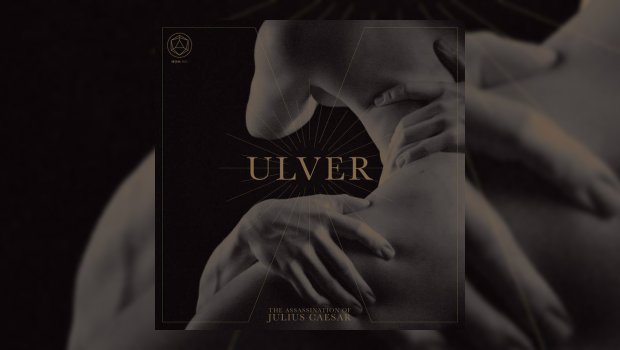It would be easy to say of any new release from Norwegian sonic pioneers Ulver “Well, that wasn’t what I was expecting!”, but I have long come to realise that it is far easier to leave all expectations at the door where this questing band are concerned whenever their latest offering lands on my virtual doormat. Like some bizarre experiment in musical quantum mechanics, Ulver seem to exist in several places at once. They are a progressive band in the real sense, and no two albums are the same. Do they always change or, as hinted at by a theme from this new album, do they stay the same but the ground beneath them is continually shifting? Who knows, not least the band themselves, but the recorded results of this continued exploration are always compelling, and as we are talking about Ulver, unlike another implied message on The Assassination of Julius Caesar, history is not always doomed to repeat itself.
The Assassination of Julius Caesar has been described by Kristoffer Rygg as Ulver’s “pop album”, but this is the kind of dark and intelligent pop one might have found on Factory Records before it got silly, or 4AD or ZTT in those wilfully esoteric record labels’ far off heyday. Or, to put it another way, if the Pet Shop Boys had started life decades ago as a black metal band they might have made this record right now.
A few observations: Rolling Stone…well…rolls, with the hipswaying seductive moves of the slinkiest M People groove, led by Sisi Sumbundu’s soulful voice. 1969 transposes the power chord to the synthesiser and the result is as powerful as anything you will hear wrought out of an electric guitar, more so because it is so unexpected. Southern Gothic has all the steely swing of New Order at their most lush, and sets down a tenet as Kristoffer Rygg, a highly expressive and underrated singer, tells us “I want to tell you something, about the grace of faded things.” Names, events, numbers, and dates are important constituent parts of this remarkable record’s story, and the song 1969 contends that “Nothing has changed since the late sixties”, the present is held by links to the past.
The simply gorgeous 12” by 12” book included with the vinyl version has an image to go with each song. 1969, with its accompanying iconic image of Neil Armstrong fully spacesuited and booted, posing for his portrait, prompts one into the fascinating task of attempting to link the themes of the various tracks. We journey between Anton LaVey’s The Church of Satan at 6114 California Street, San Francisco to the attempted assassination of the Pope on 13th May 1981, to the burning of Nero’s Rome on 18th and 19th July AD64, oh so obliquely linked in the same song to the death of Diana, Princess of Wales, the Emperor and the Princess both pursued by their own personal demons. Through all this the rootless Norwegian wolf prowls through its own space and time, seemingly not held in any physical bond to the linear Earth we recognise. Everything and nothing connects these themes, just as Ulver’s music shifts ceaselessly as it moves through the universe taking its cues from all it finds around it. The wolf moans mournfully in Coming Home as Krystoffer asks “What have I done to leave you here?”
Perhaps ultimately it is all about the death of the icon, be it a person, or an entire culture.
The Assassination of Julius Caesar is produced by Martin “Youth” Glover, a man whose long and varied CV is as fascinating and as unpredictable as the band he now has at the tips of his fingers as they hover over the mixing desk. Youth has made a record in vast sonic Cinemascope, and has done so without burying the songs, which shine their lustrous dark majesty over the listener. One can easily get lost in the smothering arms of this beautiful but unsettling creature. You may get swallowed whole, but there are far worse ways to go, as there is something alluring and sexy about this beast.
Let’s get one thing straight; while confounding their fans, who, and I will include myself here, are an odd bunch who wouldn’t want it any other way, The Assassination of Julius Caesar is not reinventing the wheel, for one can point to any number of antecedents to this still remarkable record. However, what it does show is a band that has an undeniably dominant progressive gene entwined within its DNA, and one that is not afraid to take risks and will never knowingly repeat itself simply because the previous album hit the motherlode. Ulver once again prove that while prog is a style, progressive is a state of mind.
And there is more to come”
TRACK LISTING
01. Nemoralia (4:10)
02. Rolling Stone (9:26)
03. So Falls the World (5:57)
04. Southern Gothic (3:40)
05. Angelus Novus (4:07)
06. Transverberation (4:30)
07. 1969 (3:59)
08. Coming Home (7:50)
Total Time – 43:45
MUSICIANS
Kristoffer Rygg – Vocals, Programming
Jørn H. Sværen – Miscellaneous
Tore Ylwizaker – Keyboards, Programming
~ With:
Ole Alexander Halstensgård – Electronics, Vocals
Anders Møller – Percussion
Ivar Thormodsæter – Drums
Rikke Normann – Voice (track 1)
Sisi Sumbundu – Voice (tracks 2 & 7)
Dag Stiberg – Saxophone (track 8)
Nik Turner – Saxophone (track 2)
Stian Westerhus – Guitar (tracks 1 & 2)
Daniel O’Sullivan – Guitar (tracks 4 & 6)
ADDITIONAL INFO
Record Label: House Of Mythology
Catalogue#: HOM 010
Date of Release: 7th April 2017

